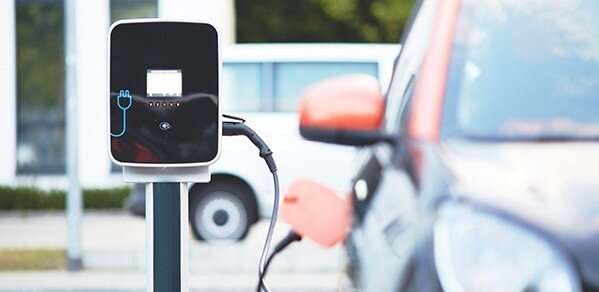A switch to battery electric vehicles is the best option for cleaner road transport, study finds

The widespread adoption of battery electric vehicles offers the greatest energy efficiency and potential for CO2 reduction, new analysis by Cambridge engineers has shown.
But they warn that in order for the full potential of battery electric vehicles (BEVs) to be unlocked, grid improvements will be necessary to meet elevated electricity demand and work will need to be done to increase charging station availability to alleviate so-called "range-anxiety"—fear that occupants of BEVs will be left stranded due to insufficient range. Their findings are published in the journal Applied Energy.
BEVs, using an all-electric pathway, and fuel-cell electric vehicles (FCEVs), requiring the use of hydrogen, are two of the forefront options for reducing the transport sector's greenhouse gas emissions.
Dr. Molly Haugen, Research Associate at the Centre for Sustainable Road Freight, and colleagues from the Department's Energy research group, carried out a stochastic analysis of the energy consumption of both low-carbon options concerning light-duty (i.e. cars) and heavy-goods vehicles.
In order to determine which energy pathway is the better option, the researchers paid attention to the following areas for both electric and hydrogen powered road transport, applicable for both current and future energy systems:
- Hydrogen and electric vehicle energy pathway efficiency
- Natural gas energy efficiency
- Grid energy efficiency
- Carbon intensity—focusing on the energy production and use while the vehicle is in operation
- CO2 intensity from natural gas and grid energy pathways
- Financial restraints of future fuel pathways.
Their analysis shows that BEVs provide sustained greenhouse gas reductions. The light-duty BEVs energy pathway minimizes CO2 emissions by reducing input energy waste and is 65% more efficient than light-duty FCEVs using grid energy. As the grid decarbonises and the technology improves, the researchers say that further CO2 emissions reductions with this pathway will be possible. Battery heavy-good vehicles are also able to achieve a lower CO2 emission in both volume and payload limited circumstances, with electric road systems being the most energy efficient pathway.
Meanwhile, in a maximized trailer volume scenario, electric and fuel-cell heavy-good vehicles have similar projected carbon intensities from a natural gas primary energy source. However, electric heavy-goods vehicles using conventional battery systems or an electric road system are able to achieve a 55% and 67% carbon reduction compared to fuel-cell heavy-goods vehicles, respectively.
In comparison, the hydrogen system used by FCEVs has a carbon footprint (per km driven) that is two to three times higher due to the system's inefficiency and which requires two to three times more renewable energy than an electric energy system.
Dr. Haugen said: "Battery electric vehicles (BEVs) and fuel-cell electric vehicles (FCEVs) are low-carbon options that reduce tailpipe emissions, but differ in overall efficiency, associated carbon intensity, and cost. As we inch closer to the UK Government's committed 2050 deadline, requiring the UK to bring all of its greenhouse gas emissions to net zero by this date, a decision needs to be made on which pathway—all-electric or hydrogen—to dedicate resources, funding and research.
"We evaluated both battery electric and hydrogen fuel-cell vehicle energy systems, from energy source to energy use, and highlighted where the system is losing energy; how those components affect the overall system efficiency; and related CO2 emissions. From this, it is clear that a hydrogen-based energy system will require either a technology that has yet to take off commercially (namely, steam methane with carbon capture and storage) or significant renewable energy resources. Even if these requirements are met, any hydrogen energy pathway will have higher CO2 emissions than an all-electric pathway in the UK and will require two to three times more primary energy. With this, using renewable energy to produce hydrogen for fuel-cell use, and consequentially wasting approximately 60% of it to system processes, will hinder the ability of renewable resources to aid in decarbonising other sectors."
More information: Molly J. Haugen et al. A fork in the road: Which energy pathway offers the greatest energy efficiency and CO2 reduction potential for low-carbon vehicles?, Applied Energy (2020). DOI: 10.1016/j.apenergy.2020.116295


















